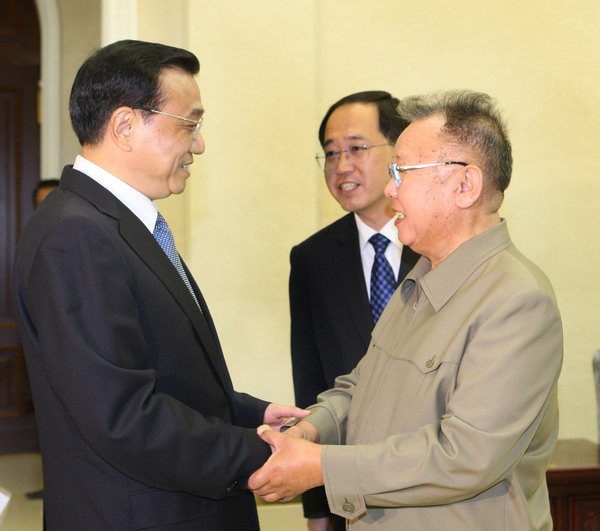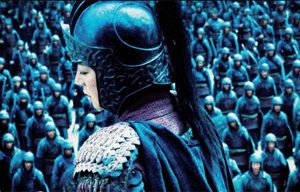DPRK sets basis for talks
Updated: 2011-10-26 07:15
By Qin Jize (China Daily)
|
|||||||||
|
 Vice-Premier Li Keqiang meets Kim Jong-il, the top leader of the Democratic People's Republic of Korea, in Pyongyang on Monday. Li finished his three-day visit to the country on Tuesday. [Photo by Yao Dawei/Xinhua]
|
Vice-premier ends visit amid renewed sense of optimism
PYONGYANG / BEIJING - Vice-Premier Li Keqiang wrapped up his three-day visit to the Democratic People's Republic of Korea (DPRK) on Tuesday amid renewed hopes for the stalled Six-Party Talks following the DPRK top leader's latest offer of fresh nuclear negotiations.
Adding to the renewed optimism is the progress in Geneva where US and DPRK representatives on Tuesday concluded two days of talks on Pyongyang's nuclear program.
In a meeting with Li on Monday, DPRK top leader Kim Jong-il said the country hopes that the Six-Party Talks will "be restarted as soon as possible".
"All the six parties should fully implement a joint statement reached in September 2005 in Beijing, on the principle of simultaneous action," the Xinhua News Agency quoted Kim as saying.
Under the 2005 agreement, the DPRK agreed to abandon its nuclear program in exchange for economic and diplomatic incentives to be provided by the other parties involved in the negotiations. But the embryonic agreement was never implemented.
Kim's remarks came as the US said it had narrowed differences with the DPRK on issues standing in the way of a new round of multilateral nuclear talks.
Stephen Bosworth, US special representative for DPRK policy, gave an upbeat assessment in Geneva on Monday and said that the talks were "moving in the right direction", but that differences needed to be narrowed further.
"As I said we have made some progress, but we have issues still to resolve and we will work hard to do that," he said.
In his meeting with Kim, Li noted that the DPRK adopted a series of active measures this year to maintain dialogue and contact with relevant parties. It has reiterated its support for the resumption of the Six-Party Talks, without preconditions, and to the denuclearization of the peninsula.
China supports the DPRK's efforts to create conditions for quickly restarting the nuclear talks, and to ease tension on the peninsula, Li said.
China is willing to continue to play a constructive role in helping improve ties between the DPRK and the Republic of Korea (ROK), and to maintain peace and stability on the peninsula, he added.
Li is scheduled to hold talks with ROK President Lee Myung-bak on Wednesday.
Men Jing, a professor at the College of Europe in Belgium, said the tight itinerary reflects China's efforts to strike a balance while dealing with the "tricky" situation on the Korean Peninsula.
Li's travel schedule underscores Beijing's good ties with both Koreas and its desire to restart the stalled talks on Pyongyang's nuclear disarmament, the Associated Press reported.
Dr Nicola Casarini, a research fellow at the EU Institute for Security Studies, said that topics during Li's visit to the DPRK included economic cooperation and special economic zones along their border.
Chinese leaders hope that reform and economic opening-up will ensure stability in the country, he said.
On the nuclear issue, "China could play a decisive role in trying to bring Pyongyang back to the negotiating table. A move that will certainly be appreciated" by other parties concerned, Casarini added.
Michael Cox, a professor of International Relations at the London School of Economics, said traditional friendship between the two countries might help the DPRK follow China's path in reform and opening-up.
Wang Sheng, an expert on the Korean Peninsula at Jilin University, said that Lee, the ROK president, is willing to improve ties with the DPRK before the end of his term next year.
"To accelerate this process, the ROK needs the efforts of China."
Despite the DPRK's willingness to restart the nuclear talks, the ROK and the US insist there will be no talks until Pyongyang's uranium enrichment is stopped, and verified by international nuclear inspectors.
The DPRK said its uranium enrichment program is designed to produce power, and argues that the 2005 agreement respects its right to the peaceful use of nuclear energy.
At a news briefing in Beijing, Foreign Ministry spokeswoman Jiang Yu said the issue "should be appropriately resolved through discussions under the framework of the Six-Party Talks".
Apart from meeting with DPRK leaders, Li also laid a wreath at the Friendship Tower in Pyongyang on Monday, paying tribute to Chinese soldiers killed in the Korean War (1950-53), and visited Kim Il-sung University where he observed a Chinese-language training course.
On Tuesday, Li visited the DPRK-China Friendship Thaekam Cooperative Farm in a suburb of Pyongyang before returning to China.
Xinhua, Reuters, AP, Fu Jing, Zhang Chunyan and Cecily Liu contributed to this story.











